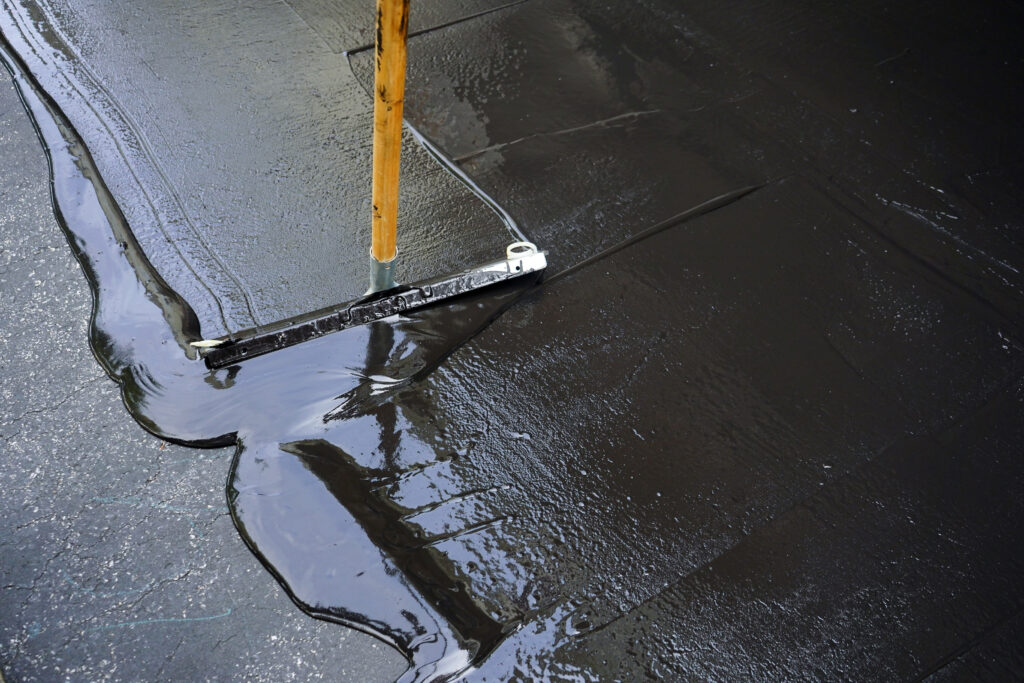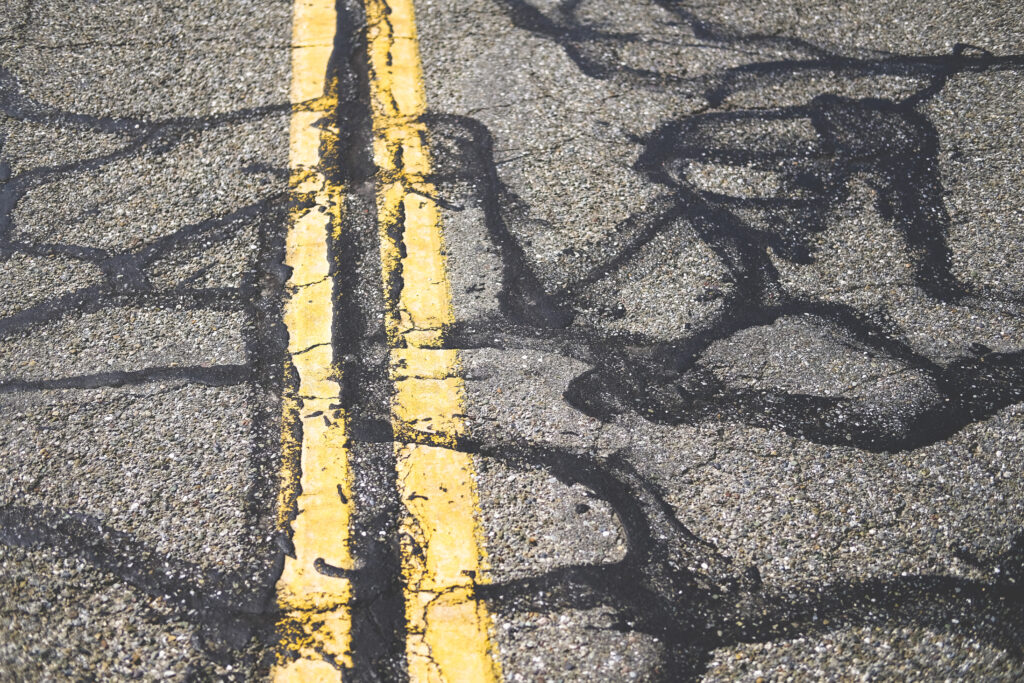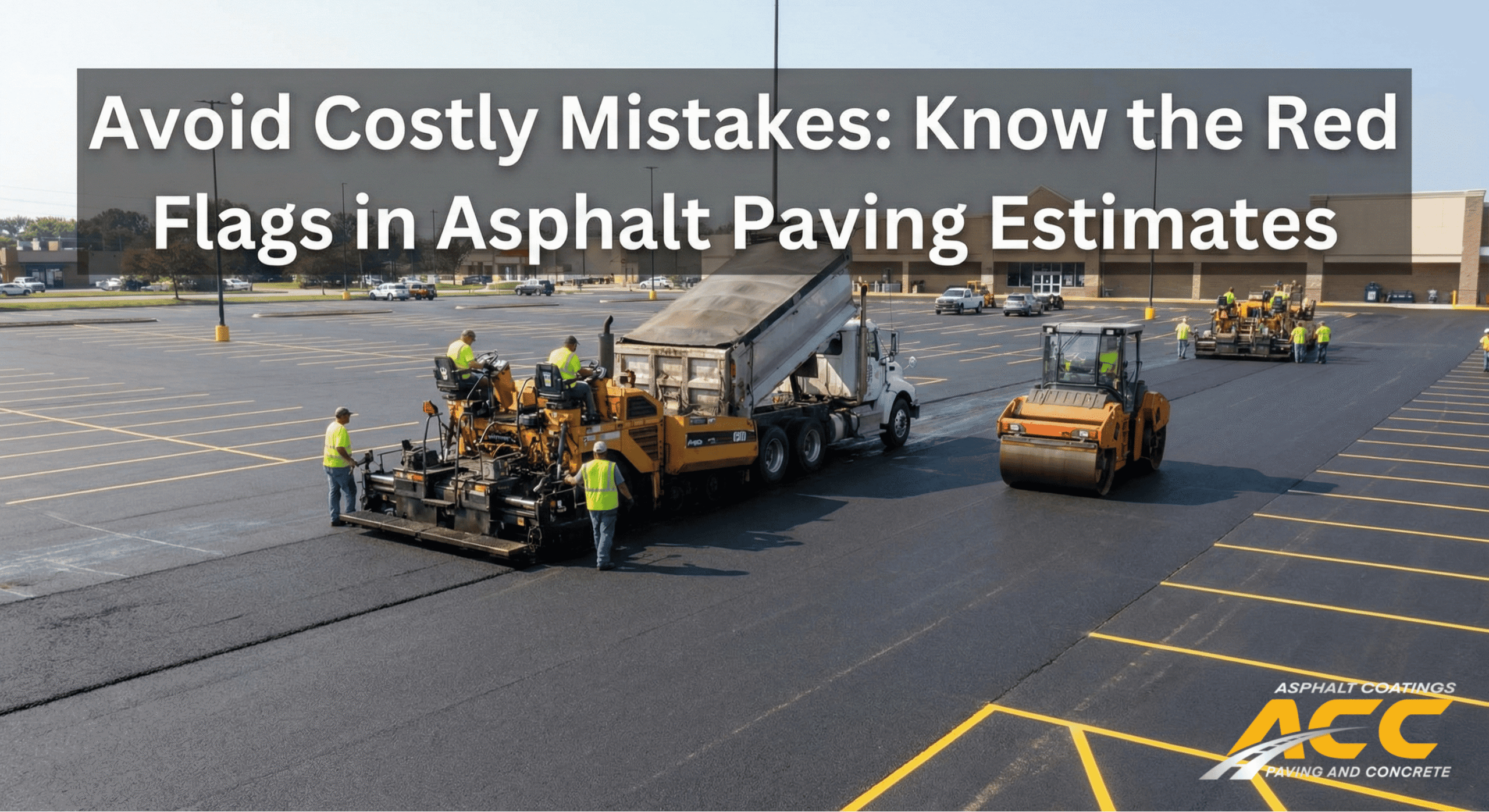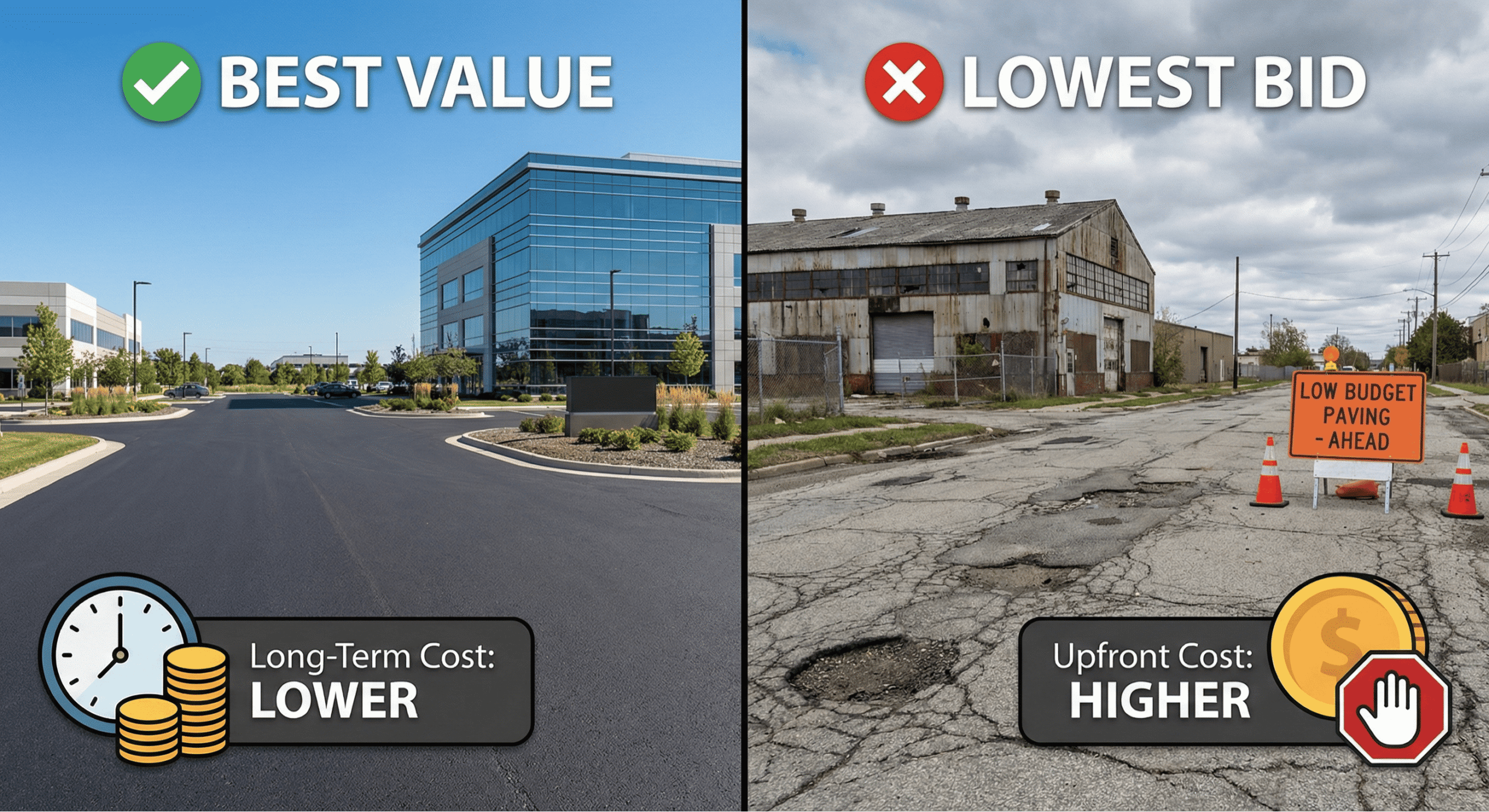
Sealcoating is the process of applying a protective coating to asphalt pavement to shield it from damage caused by weather, traffic, and chemical spills. It acts as a barrier that preserves the asphalt’s flexibility and appearance.
According to the Minnesota Department of Transportation, sealcoating can extend the life of asphalt pavement by 3-5 years per application when applied as part of a regular maintenance program.
This means that businesses investing in preventive care save significantly on long-term repair and replacement costs.
For property owners and managers in Denver, where parking lots face unique challenges from freeze-thaw cycles, heavy snowfall, de-icing salts, and strong UV rays at high altitude, sealcoating is one of the most effective ways to keep lots functional and visually appealing.
In this blog, we’ll cover the benefits, best practices, and why sealcoating is critical for Denver’s commercial parking lots.
Why Sealcoating Matters for Parking Lots
Sealcoating is more than a cosmetic upgrade. It is one of the most effective ways to protect asphalt parking lots from early deterioration and costly damage.
1. How Asphalt Breaks Down Without Sealcoating
Over time, asphalt weakens under constant exposure to sunlight, oxygen, and vehicle traffic. Without protection, the surface becomes brittle, small cracks form, and water seeps in, leading to potholes and structural issues.
2. The Protective Role of Sealcoating
A fresh sealcoat restores the protective layer that asphalt loses as it ages. It blocks out water, oils, gasoline, and de-icing salts, while also shielding the surface from UV rays. This barrier helps asphalt remain flexible, which is especially important in Denver’s freeze-thaw climate.
Research from the Federal Highway Administration shows that untreated asphalt surfaces are 60% more likely to develop cracks within 5 years compared to those that receive regular sealcoating.
Is sealcoating only for older parking lots?
No, sealcoating benefits both new and old asphalt. For new lots, it helps lock in flexibility and prevent early damage. For older lots, it rejuvenates the surface and slows further deterioration.
Key Benefits of Regular Sealcoating
Sealcoating provides more than just a fresh look for asphalt, it strengthens, protects, and extends the life of parking lots while saving property owners money over time.
- Longevity: A sealcoated parking lot can withstand harsh conditions far better than untreated asphalt. By resisting UV rays, slowing oxidation, and blocking water infiltration, sealcoating helps pavement stay flexible and last for many additional years.
- Cost Savings: Preventing damage is always more affordable than repairing it later. Sealcoating addresses surface wear early, reducing the need for expensive patching, resurfacing, or full replacement down the road.
- Curb Appeal: A newly sealcoated lot has a rich, dark finish that makes the property look clean and well-maintained. This visual upgrade improves the overall image of businesses, shopping centers, and commercial facilities.
- Protection: Sealcoating acts as a shield against oil, gas, salt, and other chemicals that often leak or spill on parking lots. This layer prevents those substances from penetrating the surface and breaking down the asphalt.
The Federal Highway Administration notes that pavement preservation strategies can significantly lower life-cycle costs; for example, Ohio DOT found that substituting chip seals for 50% of planned overlays would save over $300 million in four years on eligible low-volume roads.
How soon after paving should a lot be sealcoated?
Most contractors recommend waiting 6-12 months after new asphalt installation before the first sealcoat to allow proper curing.
Sealcoating in Denver’s Climate
Denver’s climate creates conditions that speed up asphalt damage, making regular sealcoating a critical part of parking lot maintenance.
1. Freeze-Thaw Cycles
During winter, water seeps into small cracks in the pavement. As temperatures drop, that water freezes and expands, forcing cracks to widen and weakening the surface. Repeated freeze-thaw cycles can quickly turn minor cracks into major structural issues.
2. High-Altitude Sun
At Denver’s elevation of over 5,000 feet, UV exposure is stronger than in lower-altitude cities. Prolonged sunlight accelerates oxidation, causing asphalt to lose its flexibility and become brittle. Sealcoating shields the surface from UV damage, helping the pavement stay resilient.
3. Snow, Ice, and De-Icing Chemicals
Colorado’s heavy snowfalls require frequent plowing and the use of de-icing salts. While effective for safety, both can wear down asphalt more quickly. A fresh sealcoat creates a barrier that helps protect the pavement from chemical erosion and scraping from snow removal equipment.
Does sealcoating help with freeze-thaw damage?
Yes. By sealing surface pores, sealcoating reduces water infiltration, which minimizes the risk of cracks expanding during freeze-thaw cycles. This makes it one of the most effective defenses against Denver’s harsh winters.
Cost Savings with Preventative Maintenance
Sealcoating is one of the most cost-effective ways to protect asphalt and avoid major expenses down the road.
- Lower Upfront Costs: Sealcoating requires a much smaller investment compared to full asphalt replacement, making it a cost-effective way to protect pavement and delay major expenses.
- Extends Pavement Lifespan: Each sealcoat application can add 3-5 years of service life to asphalt. Over time, this delay in major repairs results in substantial long-term savings.
- Predictable Budgeting: Preventative maintenance helps property managers plan ahead. Instead of being surprised by sudden repair costs, they can schedule sealcoating every 2-3 years and maintain consistent budgets.
- Reduced Liability Costs: Well-maintained parking lots minimize risks like potholes, cracks, and trip hazards. This reduces potential claims or legal expenses for property owners.
- Proven Value: Sealcoating is far more affordable than full asphalt replacement, which is why preventative care delivers strong long-term savings.
How often should Denver parking lots be sealcoated?
Every 2-3 years is ideal, depending on traffic levels and local weather conditions. High-use lots, like shopping centers or distribution hubs, may need more frequent applications.
Parking Lot Safety and Functionality
Sealcoating does more than protect asphalt, it also makes parking lots safer and easier to use.
- Safer Surfaces: A fresh sealcoat creates a smooth, even surface that reduces cracks, loose gravel, and skid risks for both vehicles and pedestrians.
- Better Visibility: When paired with new striping, sealcoating improves visibility of lanes and crosswalks. A CBS News article cites that the National Safety Council found “on average at least 60,000 are injured and 500 or more die in the 50,000+ crashes in parking lots and garages every year.
- Accessibility Support: Sealcoating provides the solid base needed for ADA-compliant striping and ramps, helping properties stay accessible and safe.
Does sealcoating improve ADA compliance?
Not directly, but it creates the smooth surface required for proper striping of ADA-compliant spaces and ramps.
Signs Your Parking Lot Needs Sealcoating
Several visible signs indicate it’s time to schedule sealcoating:
- The asphalt has faded from rich black to dull gray
- Small cracks are starting to spread across the surface
- Puddles remain after rain instead of draining properly
- The pavement feels rough, brittle, or uneven underfoot
Catching these early warning signs allows property owners to protect their investment before minor issues turn into costly repairs.
Can sealcoating fix potholes?
No, potholes require repair before sealcoating. Sealcoating only prevents future deterioration; it doesn’t repair existing damage.
Best Practices for Sealcoating
To get the best results and extend the life of your asphalt, sealcoating should follow a few key practices:
- Apply a fresh sealcoat every 2-3 years in Denver’s climate
- Pair sealcoating with crack sealing and striping for full maintenance
- Rely on professional crews with commercial-grade equipment for a durable finish
Can sealcoating be done year-round in Denver?
No. Sealcoating requires warm, dry weather. The best time for application in Denver is late spring through early fall.
Who Benefits Most from Sealcoating Services

Sealcoating is valuable for nearly every type of commercial property, but some benefit from it more than others:
- Retail shopping centers: keep parking areas attractive and welcoming for customers
- Industrial warehouses: protect high-traffic loading zones from heavy wear
- Apartment complexes and HOAs: reduce liability risks and improve resident satisfaction
- Churches, schools, and healthcare facilities: ensure safe, accessible parking for visitors
Does traffic volume affect how often to sealcoat?
Yes. High-traffic properties like shopping centers and warehouses may need sealcoating every 2 years, while lower-use lots can often go 3 years between applications.
Choosing a Parking Lot Contractor in Denver
Selecting the right contractor is just as important as the sealcoating itself. A trusted partner ensures your parking lot stays durable, safe, and compliant. At Asphalt Coatings Company, we bring decades of expertise and a proven track record to every project.
- Proven experience with large commercial and institutional properties
- In-house crews and equipment for efficient, high-quality work
- Local knowledge of Denver’s climate and regulations
- Positive client testimonials and case studies that show real results
Should I ask for references before hiring?
Yes. Reputable contractors will gladly provide references, project photos, and maintenance plans to give you confidence in their work.
Protect Your Denver Parking Lot with Professional Sealcoating
Sealcoating is one of the most effective ways to extend the life of your parking lot, reduce long-term costs, and maintain a professional appearance. In Denver, where climate conditions accelerate asphalt wear, proactive sealcoating is a smart investment for property managers and businesses alike.
At Asphalt Coatings Company, we’ve been providing high-quality asphalt maintenance and sealcoating services across the Denver metro and Front Range since 1986. Our in-house crews, advanced equipment, and proven track record make us the trusted choice for commercial paving.
Contact us for request a free quote to keep your parking lot in top condition for years to come.
Frequently Asked Questions
1. How long does sealcoating last in Denver?
Typically 2-3 years, depending on weather and traffic volume.
2. Can a parking lot be used immediately after sealcoating?
No, sealcoated lots require 24-48 hours of curing time before they can be reopened.
3. Is sealcoating environmentally friendly?
Yes, modern sealcoat products are designed to be low-VOC and reduce the need for full asphalt replacement, which has a larger environmental footprint.
4. Does sealcoating affect line striping?
Yes, lots are restriped after sealcoating for visibility and compliance.
5. How does sealcoating compare to asphalt overlays?
Sealcoating is a preventative measure, while overlays add a new asphalt layer to address structural issues. Overlays cost significantly more than sealcoating.



